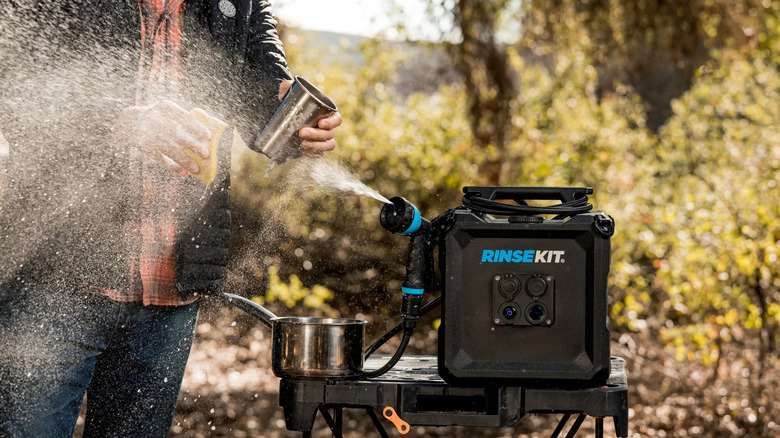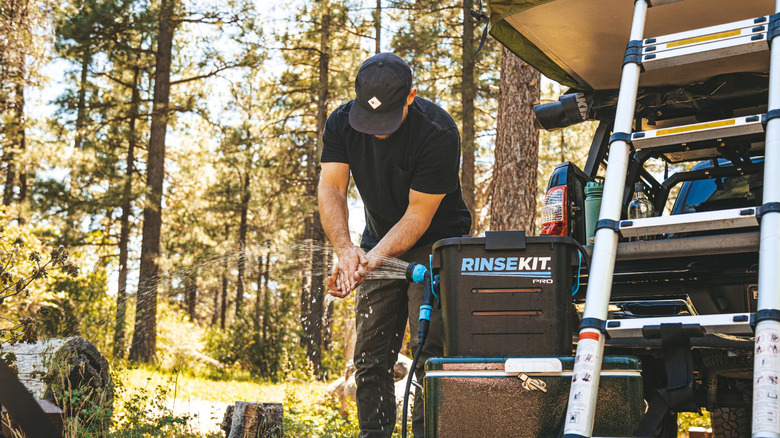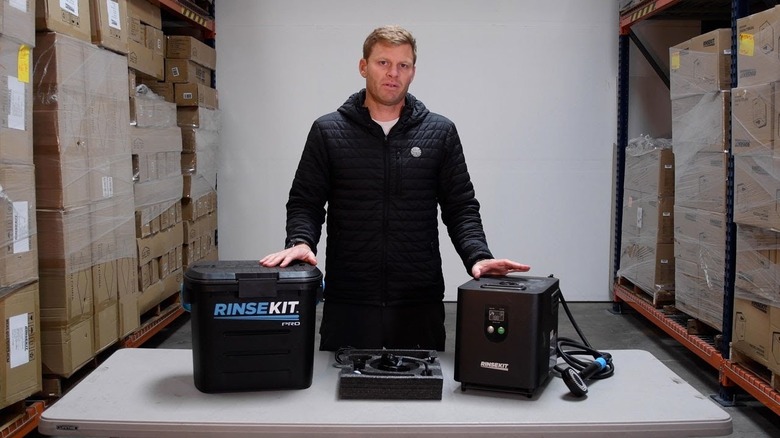What Really Came Of RinseKit From Shark Tank?
Sand and sea are two of leisure time's greatest combos, but there is also a little setback. Once you've had your fun in the surf and want to clean up, sand has that irritating tendency to stick to water. That can make for an uncomfortable journey home when you still have half the beach under your clothes.
San Diego surfers Chris Crawford and Eric Fagan unveiled an ingenious solution to this problem in Season 8 of "Shark Tank." Dressed like two guys working in a DIY store, they skipped gimmicks and went straight into a practical demonstration of the RinseKit, a portable shower unit initially designed for the beach but with many other potential applications.
The sharks were visibly impressed by the mechanics of the unit. With his pool cleaning, plumbing, and hydraulics background, Crawford invented a device that carried two gallons of water, utilizing and storing pressure from a garden faucet to provide up to 45 minutes of shower power on the go.
It was one of those items that make you wonder why no one has thought of it before. Crawford listed several other potential uses for the product, from rinsing dishes while camping to keeping cool in the heat at a soccer game. The RinseKit looked like a dead cert for an investment, but could the co-founders get the right deal?
What happened to RinseKit on Shark Tank?
After designing the RinseKit in his garage, Chris Crawford sold his pool company, took on a former client as an investor, and later succeeded in raising $800,000 through crowdfunding campaigns. He was now asking for $250,000 for 5% equity in the business, but the downside was that he and business partner Eric Fagan had already racked up $500,000 in debt.
It wasn't Mark Cuban's area of expertise, so he was first out. Kevin "Mr. Wonderful" O'Leary felt the company's valuation was expensive, worrying that it might take years for him to get his money back. The guys countered by explaining that there was plenty of scope for add-ons to make the business more lucrative.
Robert Herjavec shared O'Leary's concerns but offered them $250,000 for 20% of the company. O'Leary took a different stance, offering a quarter of a million as a loan with 5% equity. Lori Greiner, bringing her huge background in home shopping to the table, matched O'Leary's offer but wanted commission on the sales she brought in.
Herjavec increased his offer to $350,000 for 20% before Daymond John cut in with a last-minute deal. He offered $250,000 for 7.5% equity and also wanted a commission, but he wooed the guys with his relationships with retailers like Target, Home Depot, and Walmart. It was a sweet piece of maneuvering from the FUBU founder, which proved to be a no-brainer for the entrepreneurs, who gladly took the deal.
RinseKit after Shark Tank
RinseKit really blew up after Chris Crawford and Eric Fagan secured investment from Daymond John on "Shark Tank." They received calls from several major outlets, such as Costco and Amazon that wanted to carry the product. Crawford focused on developing a range of products beyond the original invention that sealed the deal on the show. The next big innovation was battery-powered heating and a pump system to pressurize the tank, resulting in the RinseKit Pro.
His next task was ahead of competitors that entered the market with similar products, making the RinseKit stand out from the crowd as a sturdy unit that would last for many years. Consumers have taken to the ingenious all-in-one shower system, rating it 4.46 stars out of five from over 1,000 reviews, and Business Insider recommended it as part of their Insider Picks series.
As of 2022, RinseKit was available in over 600 retailers across the United States, and the company was tracking nicely toward $20 million in sales, reporting an annual revenue of $1.8 million. With their products selling so well, Crawford and Fagan have used their success to help promote a good cause. It is a shocking statistic that around 2 million Americans don't have access to running water, plumbing, and sanitation, and RinseKit has teamed up with DigDeep to fund projects that address this issue. "Shark Tank" success stories are always that little sweeter when they help those in need, too.


